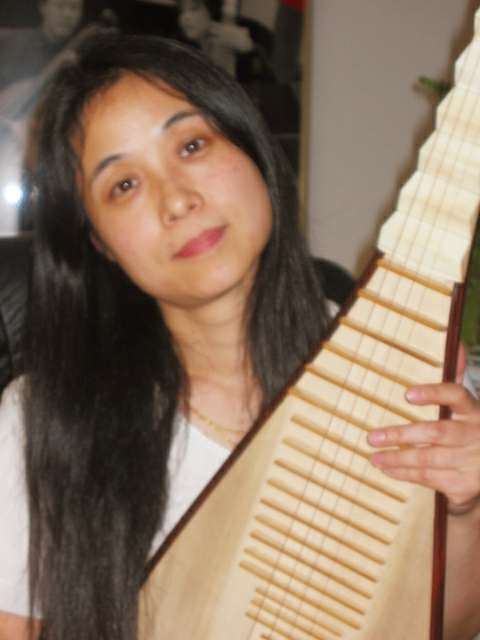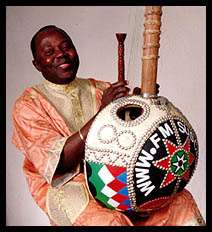|
Back
The Spirits Were Willing.. New York
Town Hall
10/24/2013 -
“In The Spirits: Music from the World’s Great Traditions”
Carlo Gesualdo: O vos omnes
Thomas Tallis: In ieiunio et fletu – Derelinquit impius
Josquin Desprez: Ave Maria, gratia plena
Orlando de Lassus: Vide homo
Philip Glass: Songs of Milarepa (New York premiere) – Orion–CHINA (arranged by Michael Riesman)
Traditional: White Snow in Spring – Buddhist Chanting (arranged for pipa and piano by Wu Man and Glass)
Foday Musa Suso: Kaabeelo – Blue Sky – Uno and Emily – Kumba
Classical Sufi Song: Yunus
Traditional Qawwali songs: Mera Piya Ghar Aaya – Chaap Tilak
Pomerium Vocal Ensemble, Alexander Blachly (Director); Scorchio Quartet: Amy Kimball, Rachel Golub (Violins), Martha Mooke (Viola), Leah Coloff (Cello); Gregory Purnhagen (Baritone); Wu Man (Pipa); Foday Musa Suso (Gambian kora [harp-lute]); Omar Faruk Tekbilek (Bamboo flute, vocals), Murat Tekbilek (Percussion), Riyaaz Qawwali: Sonny K. Mehta (Lead vocals, harmonium, Musical Director); Abed Haque (Violin), Ravi Nulu (Tabla drums), Siddharth Shah (Double-headed drums), Vaibhav Jain, Pradeep Chandramouli, Mustaf Faiz, Srajan Bhagat (Vocals), Philip Glass (Piano, Artistic Director)

Wu Man (© Coco T. Dog)
Aldous Huxley’s anthology of universal mysticism, The Perennial Philosophy made scarce mention of music. Religious writings can be translated, but music’s scales, rhythms, modes and meanings are still conceived to be “exotic.” So, despite the wonderous work of Cage, Harrison, Cowell etc, music will never be as ecumenical as philosophy. And vive la différence.
Philip Glass, though, has incessantly tried to see the soul beneath the skin. And last night, at a benefit concert for the Garrison Institute 10th Anniversary (See Coda) he produced seven totally different musics from seven different cultures. The result was a concert of discovery, revelation, exposure and frequently excitement.
How did this work? The Garrison Institute’s Jonathan Rose tossed off a statement that until 1750, “music was a search for the nature of the universe.” True, music then was a science, not an art. But to deny Mozart, Schoenberg, Carter and Beethoven the quest for their own meaningful universe would be a sin of omission. And to deny the players from these manifold countries last night a chance to produce universality would be equally short-sighted.
That elusive perennial musical philosophy was attempted through seven different performances, commencing with an authentic (and rather dull) singing of 16th Century songs (including one truly dissonant work from the that grisly murderous aristocratic, Carlo Gesualdo). After this Wu Man’s extraordinary dexterity in an ancient Chinese instrument started the miracle of the evening.
Wu Man has turned the pipa into a classical instrument the way Segovia transformed the guitar. It isn’t simply the dazzlement of her fingers, but her original tones so subtle, so different. My own years in Asia could never overcome the twanging of the pipa, but Wu Man recognizes that the native sounds are the beginning of endless colors, augmented by what I never found in Chinese musicians: charm, delight and enthusiasm. Whether she was playing a traditional tune with countless variations, or taking an arrangement she had made with Philip Glass of an ancient Buddhist chant, it was a delight to hear her.
But two of Mr. Glass’s works which followed showed the composer at his best. First was an arrangement of Orion–CHINA with the Scorchio String Quartet, and a beautiful complement of tonalities between strings and pipa.

G. Purnhagen (© www.gregpurnhagen.com)
Following that was the New York premiere of Songs of Milarepa, with lyrics by the 11th Century Tibetan saint and poet, sung in English by Gregory Purnhagen.
Mr. Purnhagen’s rich baritone voice, easily conquering the tenor range, has been an associate of Mr. Glass for many years, mainly because his voice, his words, his melodies are so clear, because they sound out the message as well as the music. The three works here brought in his voice, the quartet harp-like sonorities and Mr. Glass’s piano in three pieces, sometimes strophic, sometimes with repeating motifs on the piano, always with a sense of direction and color.
With the second half of the program, one realized how the Baltimore-born Philip Glass has touched on every culture. Yes, the Tibetan poems and works inspired by the pipa. He began his career by transcribing the music of Ravi Shankar (the Indian sub-continent), his music for the poet Rumi embraced Sufiism (the Persian Empire), and he has co-written several scores with the musician Foday Musa Suso (Gambia), each represented here.

F.M. Suso (© www.fmsuso.com)
Mr. Suso, a griot (story-teller) from Gambia took his lavishly decorated harp/lute, and somehow played both repeating motifs and variations on those motifs simultaneously. He sung for only a few bars in each song, but his voice caressed softly, almost dreamy whispering. (I personally dream of a composition that might involve the inspirational genius of the kora and Wu Man’s pipa some day.
This was followed with two Sufi songs, Omar Faruk Tekbilek playing bamboo flute, a few notes on a kind of guitar and singing, with the soft contrapuntal hand drum.
The final work was a work pure toe-tapping hand-clapping rhythms. The largest ensemble, Riyaaz Qawwalli uses eight musicians, from India, Pakistan, Bangladesh and Afghanistan, each masters of harmonium, violin, drums and most of all, singing, with a controlled wildness, bringing the audience into the ambit with no problems at all.
When I describe this group and its audience as “enthusiastic”, I use that word carefully. “Enthusiasm” means literally “bringing God into oneself”. Maybe god or gods or our own spiritual joy. Philip Glass produced the joy in this concert which, over a single evening, in Samuel Taylor Coleridge’s words, “rose inside us like a summer morn.”
*************************************************
CODA This is no place to go into the Garrison Institute outside New York, save to quote from its founder, Jonathan Rose: The Institute “develops contemplative-based programs that integrate the wisdom from deep reflection with scientific research to help solve the pressing social and environmental challenges of our time.” That’s a pretty hefty goal, but luminaries from His Holiness the Dalai Lama to Mr. Glass to countless monks, rabbis, imams, scientists and philosophers have gone to Garrison for countless retreats, lectures and...well, communing with the elements.
Harry Rolnick
|